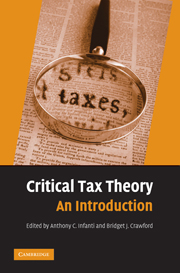Book contents
- Frontmatter
- Contents
- List of Illustrations
- List of Tables
- List of Contributors
- List of Common Abbreviations
- Introduction
- CHAPTER 1 FOUNDATIONS OF CRITICAL TAX THEORY
- CHAPTER 2 HISTORICAL PERSPECTIVES ON TAXATION
- CHAPTER 3 THE GOALS OF TAX POLICY
- CHAPTER 4 CRITICAL TAX THEORY MEETS PRACTICE
- CHAPTER 5 RACE AND TAXATION
- CHAPTER 6 GENDER AND TAXATION
- CHAPTER 7 SEXUAL ORIENTATION AND TAXATION
- CHAPTER 8 THE FAMILY AND TAXATION
- CHAPTER 9 CLASS AND TAXATION
- CHAPTER 10 DISABILITY AND TAXATION
- CHAPTER 11 GLOBAL CRITICAL PERSPECTIVES ON TAXATION
- CHAPTER 12 CRITICAL PERSPECTIVES ON CRITICAL TAX THEORY
- Index
CHAPTER 10 - DISABILITY AND TAXATION
Published online by Cambridge University Press: 04 August 2010
- Frontmatter
- Contents
- List of Illustrations
- List of Tables
- List of Contributors
- List of Common Abbreviations
- Introduction
- CHAPTER 1 FOUNDATIONS OF CRITICAL TAX THEORY
- CHAPTER 2 HISTORICAL PERSPECTIVES ON TAXATION
- CHAPTER 3 THE GOALS OF TAX POLICY
- CHAPTER 4 CRITICAL TAX THEORY MEETS PRACTICE
- CHAPTER 5 RACE AND TAXATION
- CHAPTER 6 GENDER AND TAXATION
- CHAPTER 7 SEXUAL ORIENTATION AND TAXATION
- CHAPTER 8 THE FAMILY AND TAXATION
- CHAPTER 9 CLASS AND TAXATION
- CHAPTER 10 DISABILITY AND TAXATION
- CHAPTER 11 GLOBAL CRITICAL PERSPECTIVES ON TAXATION
- CHAPTER 12 CRITICAL PERSPECTIVES ON CRITICAL TAX THEORY
- Index
Summary
The authors in this chapter explore the scattered provisions of the tax laws that impact people with disabilities. Theodore Seto and Sande Buhai, in Tax and Disability: Ability to Pay and the Taxation of Difference, illuminate disability theory, traditional tax policy, and the insights that emerge from applying both perspectives to the very structure of the tax system. Seto and Buhai suggest that cultural conceptions of disability as exclusively a medical, charitable, or even a civil rights issue should yield to what they call a “human variation paradigm of disability rights,” which would recognize that the removal of formal legal barriers to equality does not necessarily provide disabled individuals with equal opportunities. Seto and Buhai develop a set of proposals for change to the current tax system that would both fit within this paradigm and comport with generally accepted notions of the comprehensive tax base and varying individual tax burdens based on ability to pay.
Francine Lipman, in Enabling Work for People with Disabilities: A Post-Integrationist Revision of Underutilized Tax Incentives, reveals the underutilization of available business tax incentives to employ disabled people. Lipman points to lack of awareness and the complexity of applicable Code sections as principal reasons that more businesses do not take advantage of these incentives. As a result, Lipman concludes, people with disabilities remain underemployed and marginalized, and the workforce lacks a real diversity. To remedy this situation, Lipman suggests changes to the existing work incentives in the Code.
- Type
- Chapter
- Information
- Critical Tax TheoryAn Introduction, pp. 299Publisher: Cambridge University PressPrint publication year: 2009



